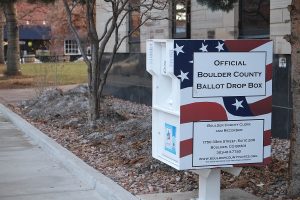Angela Benander, a spokesperson for Michigan’s Department of State, emphasized that the lawsuit is “not a legitimate legal concern” but “the latest in the RNC’s PR campaign to spread unfounded distrust in the integrity of our elections.”2
Republicans are mounting a near-unprecedented series of legal challenges against the voting rights of Americans living overseas.
According to NBC News, election officials in each of the three of the affected swing states—Michigan, North Carolina, and Pennsylvania—have strongly defended overseas voting rules, which let American tourists, expatriates, and members of the military participate in elections while abroad.
However, late last week, the Republican National Committee filed lawsuits in North Carolina and Michigan state courts.
In each complaint, attorneys for the RNC claimed that it was somehow “unlawful” to extend voting eligibility to people whose residency has not yet been verified. And, in a similar claim filed in federal court, several conservative members of Congress argued that Pennsylvania’s rules are unlawful because overseas voters do not face the same ID requirements as absentee voters casting ballots from within the United States.
Michigan Secretary of State Jocelyn Benson, a Democrat, said that the federal Uniformed and Overseas Citizen Absentee Voting Act requires that every state allow eligible citizens to vote in federal elections, even if such citizens live in another country.

Pennsylvania, Michigan, and North Carolina all exempt citizens residing or stationed abroad from having to provide identification to be sent a ballot—and for obvious reasons, considering the difficulty of verifying passports, licenses, and other documents that U.S. citizens may be required by foreign law to keep on their persons at all times.
But the Republican National Committee is, in effect, arguing that the votes of U.S. citizens abroad are less relevant than those of U.S. citizens living stateside.
“North Carolinians and Michiganders should not have their voters canceled by those who’ve never lived in the state in the first place, plain and simple,” RNC Chairman Michael Whatley said in a statement. “This is illegal and we will stop it.”
Patrick Gannon, a spokesperson for North Carolina’s bipartisan State Board of Election, has since explained why many expatriates request certain ballots from certain states.
“The [Republican National Committee] … challenged a law that allows U.S. citizens living abroad to vote in North Carolina elections when these voters’ only residential connection to a U.S. state is through their parents’ former residence in North Carolina,” Gannon said. “Otherwise, these U.S. citizens have no other way to vote in U.S. elections.”
“North Carolina lawmakers adopted this law more than 13 years ago, as a way to implement a federal law that required states to make voting more accessible for military families and other citizens living abroad,” he said. “This lawsuit was filed after voting had already begun in North Carolina for the general election. The time to challenge the rules for voter eligibility is well before an election, not after votes have already been cast.”
Angela Benander, a spokesperson for Michigan’s Department of State, emphasized that the lawsuit is “not a legitimate legal concern” but “the latest in the RNC’s PR campaign to spread unfounded distrust in the integrity of our elections.”
“It’s disappointing to see a national political party try to disenfranchise our military families but at this point, unfortunately, it’s not surprising,” she said. “We will continue our work to ensure that every voter eligible under the law can make their voices heard in this election.”
Sources
New wave of GOP lawsuits targets overseas ballots in key swing states
Republicans face backlash for lawsuits targeting overseas and military voting


Join the conversation!